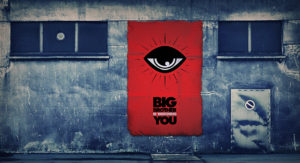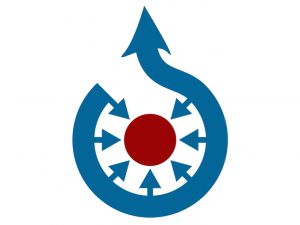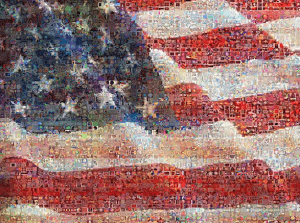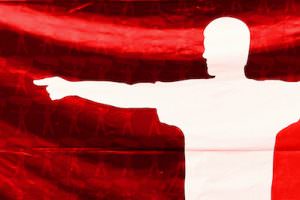One Day, You’ll Have a Chip in Your Rear
Should your car help authorities track you? Should it be a traveling billboard? … Amid emerging technology, the role of the license plate is in flux and causing controversy.
Did you ever sense, for just a moment, that an unseen someone or something was watching you? Well, often the feeling is just a feeling, nothing more, but that doesn’t mean there never are eyes trained on you from a distance. In an era of rapidly expanding technology, government and others are finding new ways to surreptitiously observe traffic, and one day your own automobile license plate will probably become their accomplice by sending out a radio signal.
Civil libertarians worry that in coming years more and more so-called radio frequency identification (RFID) data will be gathered from highways and streets as Americans take trips or go about their daily business. What underlies the concern is the widespread technology that currently is following the movements of countless animals, humans and inanimate objects.
The uneasiness was fed more fuel this year by a controversy over California legislation calling for a feasibility study of “smart” license plates. Although the digital system cited in the legislation differs from RFID and wouldn’t be intended to track motorists, many Californians feared that a first use of electronics in auto plates would open the door to mandatory devices that would allow government agents to follow cars and trucks via signals transmitted from the vehicles. Public uncertainty surrounding the system and its capabilities helped drive the argument against it.
Senate Bill 1453, which would empower the California Department of Motor Vehicles to have the study done, hit a dead end in the Assembly Appropriations Committee in August, but nevertheless in the minds of privacy advocates it remains a bad omen. Even without the bill, the notion of high-tech plates is alive and thriving: It is being nurtured by the many police officers, elected officials and bureaucrats in California and elsewhere who are locked in a love affair with the potential of the technology.
If present trends are borne out, you will have a smart plate of some kind on your car in the next 10 years or so. Already, smart plates are in use abroad, and the U.S. federal government has disclosed its interest in the possibility of having such an apparatus on motorcycles as well as cars and trucks.
In the system outlined in SB 1453, a series of scrolling advertisements would appear electronically on your back license plate, in order to be viewed by the driver and passengers behind your vehicle. If your car was moving, only the plate number would be shown, but when the vehicle was motionless for more than four seconds, an ad would materialize; a commercial image (or maybe a public service announcement or a personal message) would be displayed until the car started to move again. The images would resemble those on computer monitors, and the plates, in the words of the legislation, “would access messages from a ‘computing cloud’ or other wireless network. …”
Thousands of print publications and websites had a good laugh, or a racking cry, over the now-moribund proposal, and in July the Los Angeles Times put on its brass knucks and proceeded to beat the stuffing out of the measure. The newspaper denounced it as a “low-brow” scheme to raise money by selling ads and declared “it would be ugly and cheapening to fill California’s streets and neighborhoods with millions of mini marketing ploys. California might as well change its official nickname to the Sellout State and its official motto from ‘Eureka’ to ‘This space for rent.’ ”
Among the Times’ allegations: The devices would be road hazards because they would distract drivers. Hackers could invade the wireless system and exhibit pornography or rogue messages. The system would theoretically open the way to tracking vehicles and perhaps taxing them on the basis of miles driven. Repugnant organizations like the Ku Klux Klan might have the legal right to advertise from the back of your car.
The author of SB 1453, state Sen. Curren D. Price Jr., who represents a diverse swath of the Los Angeles area, replied in the L.A. Times to the newspaper’s criticism, starting by quoting writer Victor Hugo “as saying that there is ‘nothing as powerful as an idea whose time has come.’ ” He countered the editorial on several points, factual and otherwise, and argued:
California should not be late to the discussion of this emerging technology, whether it is used for public service or commercial messages.
… [T]his technology is coming of age, whether or not the government gets involved, and we are obligated to test it to see if it is appropriate for use on our roads. After all, California is the nation’s hub for technological innovation. …
In effect he was saying: This is the future, people—get used to it.
The possibility of such a future leaves many Californians and other Americans upset even though they know Price’s bill will not advance this time around. They fear a day when voluntary, “opt-in” electronic displays on license plates will have evolved into mandatory requirements for digital ads on all vehicles or for RFID devices that would subject every driver to souped-up tracking.
In 2009 the U.S. Department of Transportation solicited bids for study and development of an RFID license plate system. (Government posting here.) The primary purpose stated was to help police cope with motorcyclists who were too fast for pursuing officers. A microchip in a motorcycle’s plate would transmit identifying information to police, who then, presumably, could take their own sweet time in dealing with the speeder. (Some civil libertarians would claim that mandating license plate RFID in response to such a relatively small problem would be a case of killing a gnat with a nuke.)
A 2005 article in Wired magazine, headlined “British License Plates Get Chipped,” said that the U.K. government was “preparing to test new high-tech license plates containing microchips capable of transmitting unique vehicle identification numbers and other data to readers [electronic reading devices] more than 300 feet away.” It added: “Officials in the United States say they’ll be closely watching the British trial as they contemplate initiating their own tests of the plates, which incorporate radio frequency identification, or RFID, tags to make vehicles electronically trackable.”
Wired said further:
Proponents argue that making such RFID tags mandatory and ubiquitous is a logical move to counter the threat of terrorists using the roadways, and that it will scoop up insurance and registration scofflaws in the process.
… Privacy advocates are less enthusiastic about the technology.
“It’s too easy for (RFID license plates) to become a back-door surveillance tool,” said Jim Harper, director of information studies at libertarian think tank the Cato Institute and a member of the U.S. Department of Homeland Security’s Data Privacy and Integrity Advisory Committee.
… The point of the [British] test is to see whether microchips will make number plates harder to tamper with and clone, said U.K. Department for Transport spokesman Ian Weller-Skitt.
According to one Internet site, the British government was “tight-lipped about the details” of the test, and indeed no findings seem to have been publicized. What’s important here is that smart-plate technology has been in the wind internationally for a number of years and is of sharp interest to law enforcement and other governmental agencies in foreign countries as well as the U.S.
“RFID is all the rage these days,” said one American lawyer who fears “this use of the technology is tracking at its worst.” RFID chips are now embedded in many license plates in Malaysia and South Africa. In May, Portugal found itself facing a privacy-propelled outcry against a national law requiring that all vehicles have microchip license plates by July of next year.
RFID chips aren’t in standard license plates in the U.S., but the technology has a substantial presence on American thoroughfares. It is now used in automated collection of highway or bridge tolls and for a number of other traffic-related purposes.
Worldwide, RFID tracking chips have been embedded in millions of animals, including pets, and in a relatively small number of humans. Proposals for implanting them in children as a safeguard against their being kidnapped or becoming lost have generated much controversy. Merchandise, charge cards, driver’s licenses and passports are among the many objects being followed electronically. In recent days the leading U.S. mountain resort company announced it is now using chips in tickets and passes in a sophisticated system that tracks the runs of skiers at five Colorado and California resorts.
The active RFID that is made possible by embedded microchips is a major advance over using optical character recognition to read license plates. It is much more accurate than the optical method, which currently is employed by police in a number of localities. In the optical systems, the equipment is entirely on the scanner end and doesn’t depend on anything being embedded in license plates or attached to the vehicles being targeted.
A news report from Auburn, Calif., last December described how a system works in that town of 13,000. Three cameras atop a patrol car scan license plates in nearby traffic and then the numbers are sent to a database.
“ ‘Thousands of plates an hour is a lot more than the usual one at a time, and a lot more than I can do just entering manually,’ said an appreciative [Officer Stan] Sedillo. … The cameras work in all weather conditions, with infrared for night work. They also can take pictures at high [vehicular] speeds,” the article said. “… [In a period of about 10 months] the system has run more than 400,000 plates in Auburn and has recovered 22 stolen vehicles resulting in five different arrests.”
Kansas City has seven of the optical readers and consequently a civil liberties dust-up, according to a Kansas City Star article published last month. An executive of the American Civil Liberties Union protested the recording of the locations of people “as we go about our daily lives.” Dan Winter said: “All people in America are presumed innocent and law-abiding unless the evidence indicates otherwise. The very nature of these surveillance cameras turns that presumption of innocence on its head—into a presumption that we are all guilty.” The article continued:
Over time, as more information is collected, [a database attached to a scanning system] is more likely to reveal a particular vehicle’s movements, according to a privacy study released last year by the International Association of Chiefs of Police, which supports police use of the license plate readers.
The study noted that residents may worry that cameras would collect their license plate numbers at places with which they may not prefer to be linked, such as addiction counseling meetings, doctors’ offices or staging areas for political protests.
Kansas City police officers, like officers in California’s Auburn, praise the optical system as a crime-fighting tool. Certainly, police departments would not be displeased if state governments demanded smart plates on all vehicles, opening the way to RFID systems that would far outperform the optical readers.
Among civil libertarians, apart from their fear of governmental abuse, there are forebodings that location, tracking and identification data will be improperly exploited for commercial reasons. A business might have a wealth of information on each customer who drove into its parking lot. Although some high-minded companies might employ collected data to better serve their customers, many others would use the information as a tool of manipulation to dig deeper into wallets, and the line between help and manipulation surely would be wavy and indistinct.
In London last fall, the British wing of the Castrol motor oil company unveiled a system that used optical reading of license plates to enable five roadside billboards to tell individual drivers what oil they should be using. When a Jaguar approached one of the signs, a message appeared saying, “The right oil for your car is: Castrol Magnatec 5W-30 A1.” The system knew the auto was a Jag because a nearby scanner was connected to a database of the governmental Vehicle Licensing Agency, which matched up the license number with the kind of car to which it was issued. Castrol maintained that no information on vehicles passing the signs was retained.
The British website reporting on the billboard system noted: “ANPR [automated number plate recognition] cameras are used by law enforcement and private companies throughout the US and the UK with no established legal framework limiting their use.”
Public opinion about tracking traffic with optical readers or RFID, and about smart plates capable of showing ads, covers a wide spectrum.
Some think that any high-tech tracking that has not received permission from the targeted drivers is a gross violation of privacy rights. Some also vigorously oppose any system that would force motorists to have digital plates on their cars, and even if ad-displaying plates were optional, many Americans would object to the devices being on the vehicles of others, on the grounds of safety, aesthetics or taste.
On the other hand, there is a set of contrary attitudes that could be summed up as follows: “I’m law-abiding and have nothing to hide. I don’t mind being tracked if tracking helps police keep me safe in traffic or keep criminals from harming society.” At least some who hold these attitudes would see a comprehensive RFID system as a wonderful convenience and timesaver that might permit them to pay for highway and bridge tolls, meter parking, garage parking, valet service, parking fines, car washing, roadside repair, towing and many other things in one single action every month.
Clearly these are complex issues on which reasonable people may disagree and argue; in many cases the questions will be decided ultimately by our legislatures and our courts. One thing is sure: In a brave new world where license plates can display advertisements or transmit signals to databases and nearby police officers, citizens must be earnestly involved in related matters of aesthetics, safety and rights.
Even in a present society awash in complaints that “there is no more privacy,” we should not glumly accept every new reduction in our ability to keep some things to ourselves. The utmost vigilance must be exercised in the face of sometimes bewildering technological change. Government officials and companies must be held to account for what they propose and do. If the public fails to engage, if it fails to resist in an organized way when necessary, if it uncritically accepts government and corporate initiatives, we invite major losses in rights and quality of life.
Increasingly, technology will expand human capability, but at the same time it will pose risks that cannot be ignored. Citizens must insist that there be a thorough, honest and deep-reaching dialogue about any proposed law or practice that might infringe on the public good. That dialogue should be deliberately and heavily biased toward civil liberties and the public’s long-term well-being, as opposed to favoring self-interested governments and businesses that are all too likely to try to use their riches and other resources to gain the upper hand. Every new electronic advance should be accompanied by public protection that has the sharpest of teeth, and existing technology-related practices should be rolled back or eliminated if courts find them to be abusive.
We cannot drop our guard as new technology comes into play. If we doze off, we will wake up stripped and shivering in a world that is mercilessly crass and where privacy is only a quaint memory from another time.
T.L. Caswell was on the Los Angeles Times editing staff for more than 25 years and now edits and writes for Truthdig.
Your support matters…Independent journalism is under threat and overshadowed by heavily funded mainstream media.
You can help level the playing field. Become a member.
Your tax-deductible contribution keeps us digging beneath the headlines to give you thought-provoking, investigative reporting and analysis that unearths what's really happening- without compromise.
Give today to support our courageous, independent journalists.






You need to be a supporter to comment.
There are currently no responses to this article.
Be the first to respond.